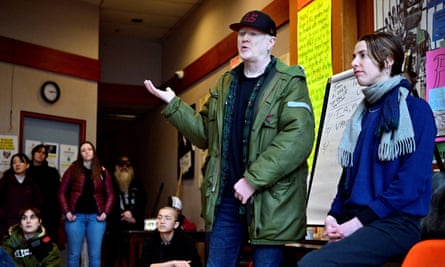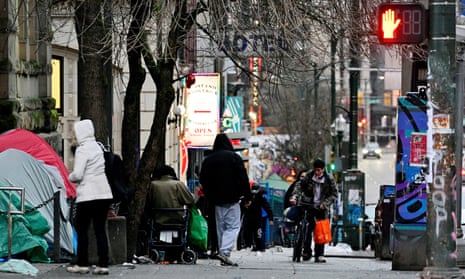East Hastings Street in Vancouver’s Downtown Eastside has long been the epicenter of Canada’s deadly opioid crisis. For years, lines of tents, discarded needles and open drug use have been common sights.
Residents of the neighbourhood have repeatedly called for a radical change to the government’s approach to illegal drugs, particularly since a recent spate of overdose deaths.
This week, they got their wish. An exemption came into effect on Wednesday, allowing any resident of the province of British Columbia to possess 2.5 grams of ecstasy, crack, cocaine or heroin – and even the powerful synthetic opioid fentanyl – without fear of criminal charge.
The province will no longer arrest, prosecute, fine or jail drug users, nor will it seize their drugs.
“It gets the police out of the lives of drug users,” says Kennedy Stewart, a former mayor of Vancouver, who supported the change.
Garth Mullins, an organizer with the Vancouver Area Network of Drug Users (Vandu) and host of the Crackdown podcast, argued that decriminalization means “less drug seizures, less charges, less arrests, less jail time, less courts, less of the state seizing your kid, less of you getting fired because you’ve used an illegal substance, less getting evicted”.
Police officers in Vancouver will now offer drug users “health service referral cards”, designed to encourage them to seek treatment.
The new change puts British Columbia in rare company: in North America, only the state of Oregon has abandoned criminal prohibitions for drug possession. Internationally, only a handful of countries take a similar, health-centric approach to narcotics.
The change was prompted by a staggering death toll: since 2016, the opioid crisis has killed more than 33,000 Canadians, with British Columbia bearing the brunt of the deaths. In 2022, the province saw 2,300 deaths, making it and the year before the joint deadliest on record.
Drug reform advocates say decriminalization won’t fix the opioid crisis – but it will, they say, stop making things worse.
The upswing of deaths in Canada and the US did not correlate to an increase in drug use, but a change in the drug supply.
Around 2016, the powerful synthetic opioid fentanyl began hitting the streets. At first, it filtered into the supply of heroin and other drugs, but it has increasingly become a sought-after drug on its own. By weight, fentanyl costs the same as heroin, but is orders of magnitude more powerful.
Many of the dead did not know how much of their supply of heroin or cocaine contained fentanyl, if they knew there was any at all.

“The police go and crack down on heroin, right? That opens up this vacuum and fentanyl comes in,” Mullins says. More recently, police efforts to disrupt fentanyl shipments have seen a surge of other depressants, like benzodiazepine, and tranquilizers like xylazine. Both those drugs make overdoses more severe, and harder to reverse.
Mullins and his allies have made clear that decriminalization is the next step, but not the final one. Above a tent on Hastings Street, a handpainted sign reads: “Safe supply, or we die.”
Despite his enthusiasm in legalizing cannabis, and regulating its production, the prime minister of Canada, Justin Trudeau, has opposed broader decriminalization.
But Trudeau’s government has greenlit a series of pilot projects that prescribe opioid and opioid analogues to drug users, in hopes that a regulated, legal and consistent supply of the drugs would reduce those accidental poisonings and overdoses.
In practice, however, those safe supply programs have only been scaled up to reach a small fraction of drug users. But they have already started to catch political heat.
The Conservative party leader, Pierre Poilievre, Trudeau’s main rival, has described the situation in Vancouver as a “failed experiment”, calling it a “deliberate policy by woke … governments to provide taxpayer-funded drugs, flood our streets with easy access to these poisons”.
In Vancouver, Stewart lost his re-election bid, in part due to a perception that crime is rising around the Downtown Eastside. He’s writing a book about his experience: Decrim: How We Decriminalized Drugs in British Columbia is due out in May.
Both Mullins and Stewart acknowledge that counseling and treatment are a necessary part of ending the overdose epidemic. But Mullins says seeking help is not as easy as it sounds. There are long waiting lists to get into treatment programs, and many require that users detox before they show up.
Even those who enter into treatment frequently relapse, and go back to use the same tainted supply. “If someone dies partway through,” Mullins says, “it’s not a success.”
